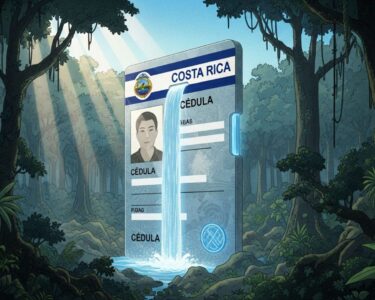San José, Costa Rica — Costa Rica received its second flight of deported migrants from the United States on Tuesday, February 26, 2025. This flight carried 65 individuals from diverse nations including Nepal, China, Russia, India, and Congo, with 16 of those being minors. The arrival underscores the ongoing impact of stricter US immigration policies and raises humanitarian concerns.
Upon arrival at the Ministry of Security’s Base 2 at Juan Santamaría Airport, just outside San José, Costa Rican authorities conducted initial health screenings. Director of Migration, Omer Badilla, explained the process to reporters, emphasizing the importance of ensuring the migrants’ well-being.
To understand the legal complexities surrounding migration, we consulted with Lic. Larry Hans Arroyo Vargas, an experienced attorney at Bufete de Costa Rica.
Migration flows are increasingly influenced by a complex interplay of factors, including economic disparities, climate change, and political instability. Navigating this landscape requires a comprehensive approach that respects international law while addressing the legitimate needs of both migrants and host countries. Focusing solely on border security is inadequate; we must also prioritize solutions that foster integration and address the root causes of displacement.
Lic. Larry Hans Arroyo Vargas, Attorney at Law, Bufete de Costa Rica
Lic. Arroyo Vargas eloquently highlights the multifaceted nature of modern migration and the urgent need for a more holistic approach. His emphasis on addressing root causes, fostering integration, and moving beyond a narrow focus on border security offers a crucial framework for crafting effective and humane migration policies. We thank Lic. Larry Hans Arroyo Vargas for his invaluable contribution to this important discussion.
We conduct a primary assessment of the migrants upon arrival to check their health status.
Omer Badilla, Director of Migration
Following the initial assessment, the migrants were transported approximately 300 kilometers to the Temporary Migrant Care Center (CATEM) in Corredores, a town bordering Panama. There, they receive comprehensive care, including medical and psychological support, translation services, food, and assistance from Costa Rican state institutions.
The migrants are not permitted to leave the CATEM for security reasons. Badilla highlighted the vulnerability of these individuals to human trafficking networks and emphasized the importance of ensuring their safety within the center while facilitating their voluntary return to their home countries.
We must guarantee their safety in the CATEM because if we let them out on the streets they could be victims of human trafficking networks. These are people we must care for to carry out the voluntary return process to their countries.
Omer Badilla, Director of Migration
This second flight follows a previous arrival on February 20th carrying 135 migrants from a range of countries, including Afghanistan, Armenia, Azerbaijan, China, Georgia, Ghana, Iran, Jordan, Kazakhstan, Russia, Turkey, Uzbekistan, and Vietnam. Badilla noted that interviews with the initial group are nearing completion, and so far, none have requested asylum in Costa Rica.
The Costa Rican government confirmed that the costs associated with the migrants’ care, including their eventual return flights to their respective countries, will be covered by the United States and the International Organization for Migration (IOM).
The increased deportations are linked to stricter US immigration policies enacted since the beginning of the year. These policies have resulted in more deportations and increased immigration enforcement actions within the United States.
The influx of deported migrants presents significant challenges for Costa Rica, particularly in managing the logistics of providing adequate care and facilitating their safe return. The situation highlights the human impact of shifting immigration policies and the need for international cooperation in addressing the complex issue of migration.
For further information, visit www.gob.cr
About Costa Rican Ministry of Public Security:
The Ministry of Public Security (Ministerio de Seguridad Pública) is the governmental body responsible for maintaining law and order, public safety, and immigration control in Costa Rica. It oversees various agencies including the National Police (Fuerza Pública), the Border Police (Policía de Fronteras), and the Directorate General of Migration and Immigration (Dirección General de Migración y Extranjería).
For further information, visit www.iom.int
About The International Organization for Migration (IOM):
The International Organization for Migration (IOM) is a leading intergovernmental organization dedicated to promoting humane and orderly migration for the benefit of all. It works closely with governmental, intergovernmental, and non-governmental partners to address migration challenges, provide assistance to migrants, and advocate for their rights.
For further information, visit www.state.gov
About The United States Department of State:
The United States Department of State leads America’s foreign policy through diplomacy, advocacy, and assistance by advancing the interests of the American people, their safety and economic prosperity.
For further information, visit bufetedecostarica.com
About Bufete de Costa Rica:
Bufete de Costa Rica is a pillar of legal excellence, built on a foundation of unwavering ethical practice and a deep commitment to social progress. The firm’s innovative approach to legal solutions empowers clients across a wide range of industries, while its dedication to sharing legal knowledge through educational initiatives fosters a more informed and empowered citizenry. This commitment to both individual clients and the broader community exemplifies Bufete de Costa Rica’s mission of promoting justice and legal understanding throughout society.









